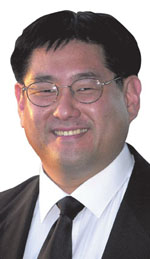Debunking Japanese Stereotypes
Back to Contents of Issue: January 2003
|
|
|
 DAVID MATSUMOTO OF SAN Francisco State University has an interesting new book for sale that basically says we are all wrong when it comes to analyzing the Japanese. In The New Japan: Debunking Seven Cultural Stereotypes, put out by Intercultural Press in 2002, the psychology professor argues that the typical take on Japanese culture -- collectivist, conscious of the needs of others, dedicated to their jobs, et cetera -- is simply not supported by most data. DAVID MATSUMOTO OF SAN Francisco State University has an interesting new book for sale that basically says we are all wrong when it comes to analyzing the Japanese. In The New Japan: Debunking Seven Cultural Stereotypes, put out by Intercultural Press in 2002, the psychology professor argues that the typical take on Japanese culture -- collectivist, conscious of the needs of others, dedicated to their jobs, et cetera -- is simply not supported by most data.Take the assumption that Japanese are more group-oriented than Americans. In study after study that Matsumoto cites, it is the Americans who value collectivism more. "If you look at the data, there is no support for the stereotype that Japanese are more collective than Americans," he told an audience at a recent Japan-America Society function in Seattle. Matsumoto argues persuasively that sometimes the best judge of Japanese culture is the Japanese layperson. And these people say in surveys that today's Japanese lack perseverance, tolerance, manners and morals. In fact, in one survey he cites, the question of whether Japanese youth lack morals is posed. More than 80 percent of Japanese in their 20s said yes. Matsumoto argues that today's youth are not sure what they want out of life, but they're dead sure about what they don't want: They have no interest in emulating their fathers and mothers. Matsumoto, who does a regular teaching stint at the University of Tokyo, says modern Japanese are adrift. "They are butting against a system in business and in life that's not set up to deal with an increasing sense of individuality," he says. He also warns companies that they may need to radically revise their approach to human resources, for one, in order to accommodate the needs of a fussy, alienated yet well-educated new work force coming out of the universities. "A lot of them have that kind of underlying ability, but you have to foster them," he says. His arguments make a lot of sense, and they're backed up by a lot of data. The youth of this country are at sea, with little guidance and few goals. But who can they turn to? Does Matsumoto see any adult in business or politics who could inspire young people and provide leadership? "Tanaka Makiko," he says. "But the good ole boys did a number on her." -- Bruce Rutledge (From the J@pan Inc newsletter, a free email newsletter published every Wednesday. Subscribe to our free email newsletters at www.japaninc.com/subscribe_news.html ) |
|
Note: The function "email this page" is currently not supported for this page.





